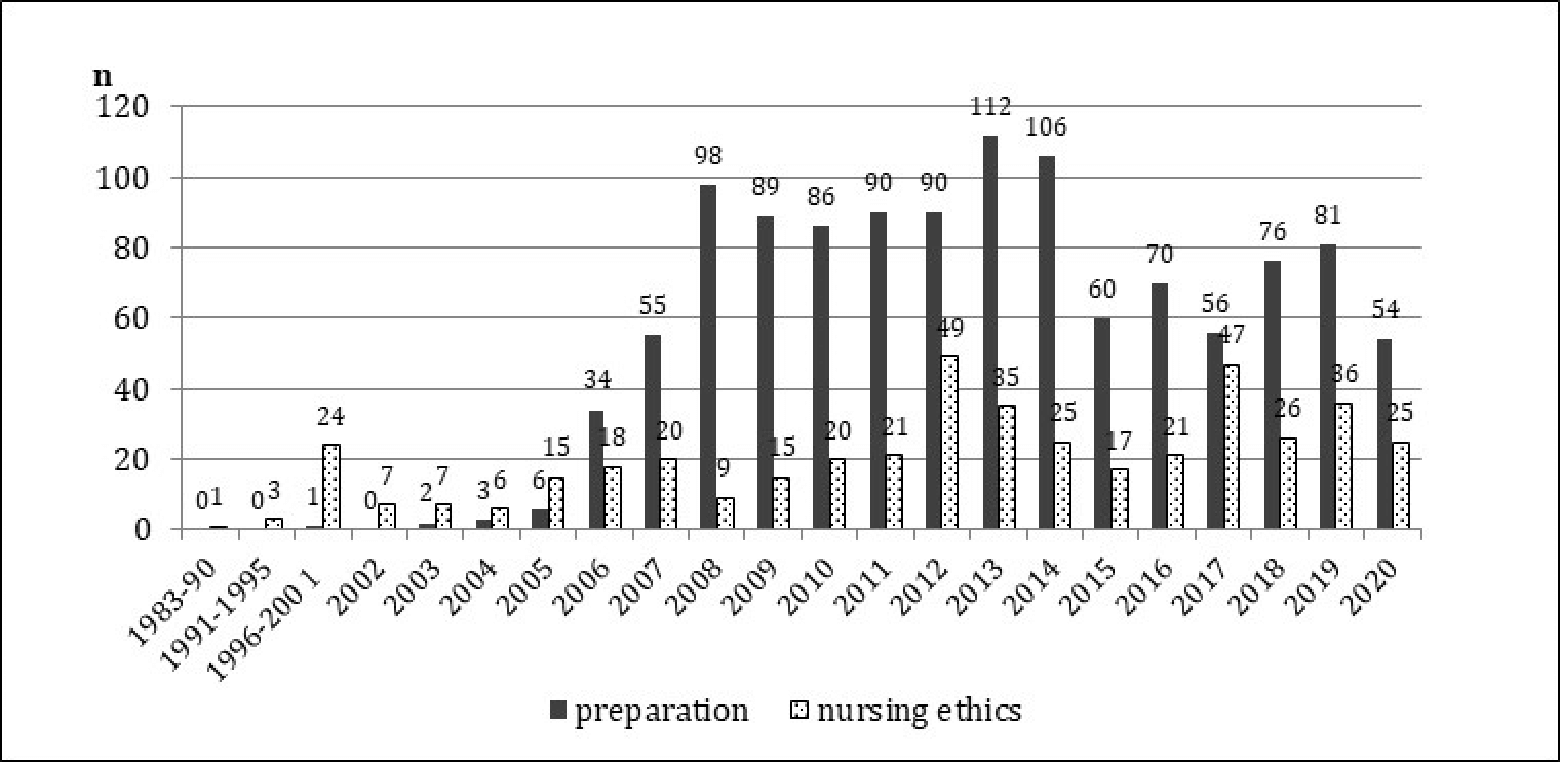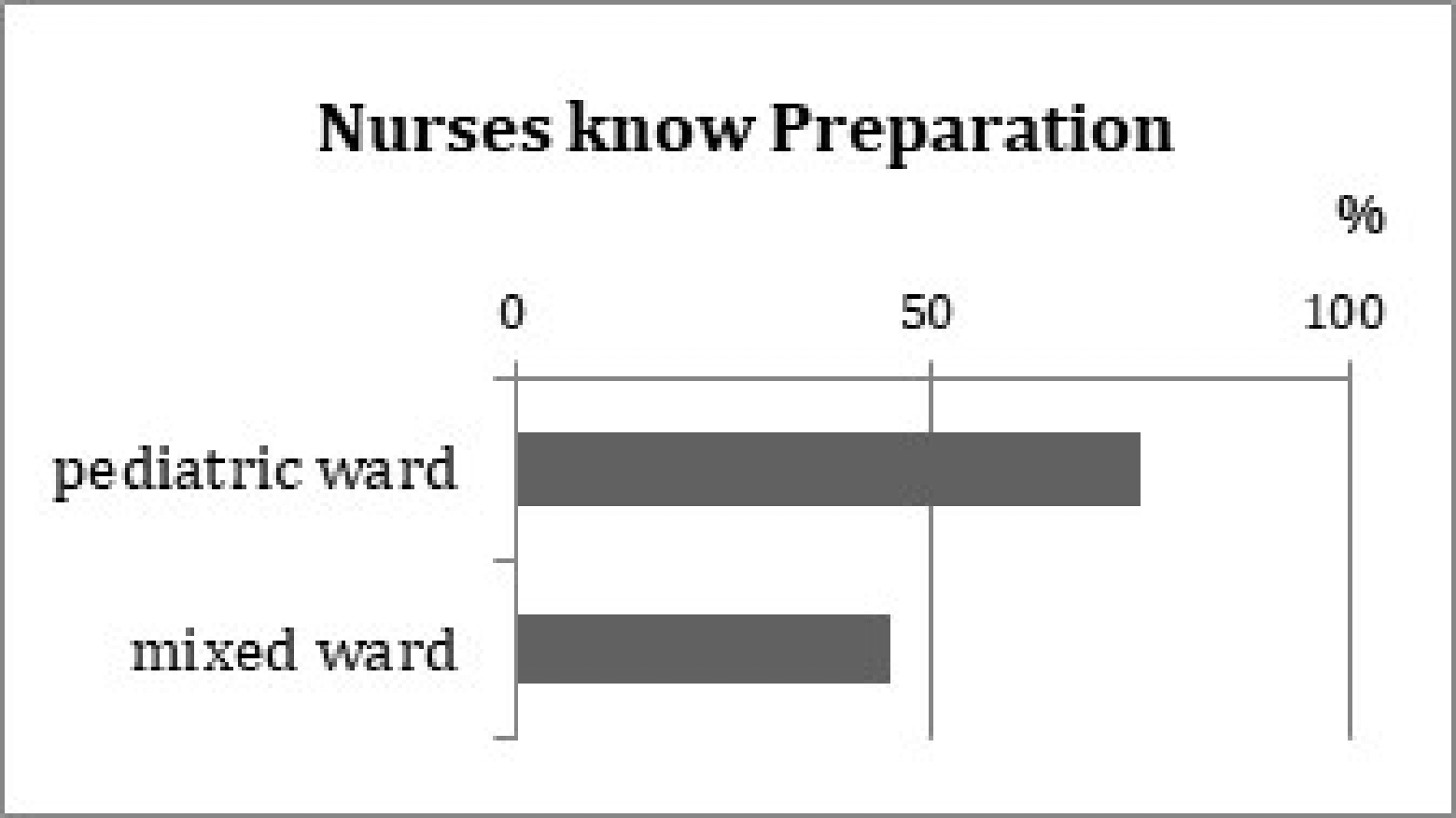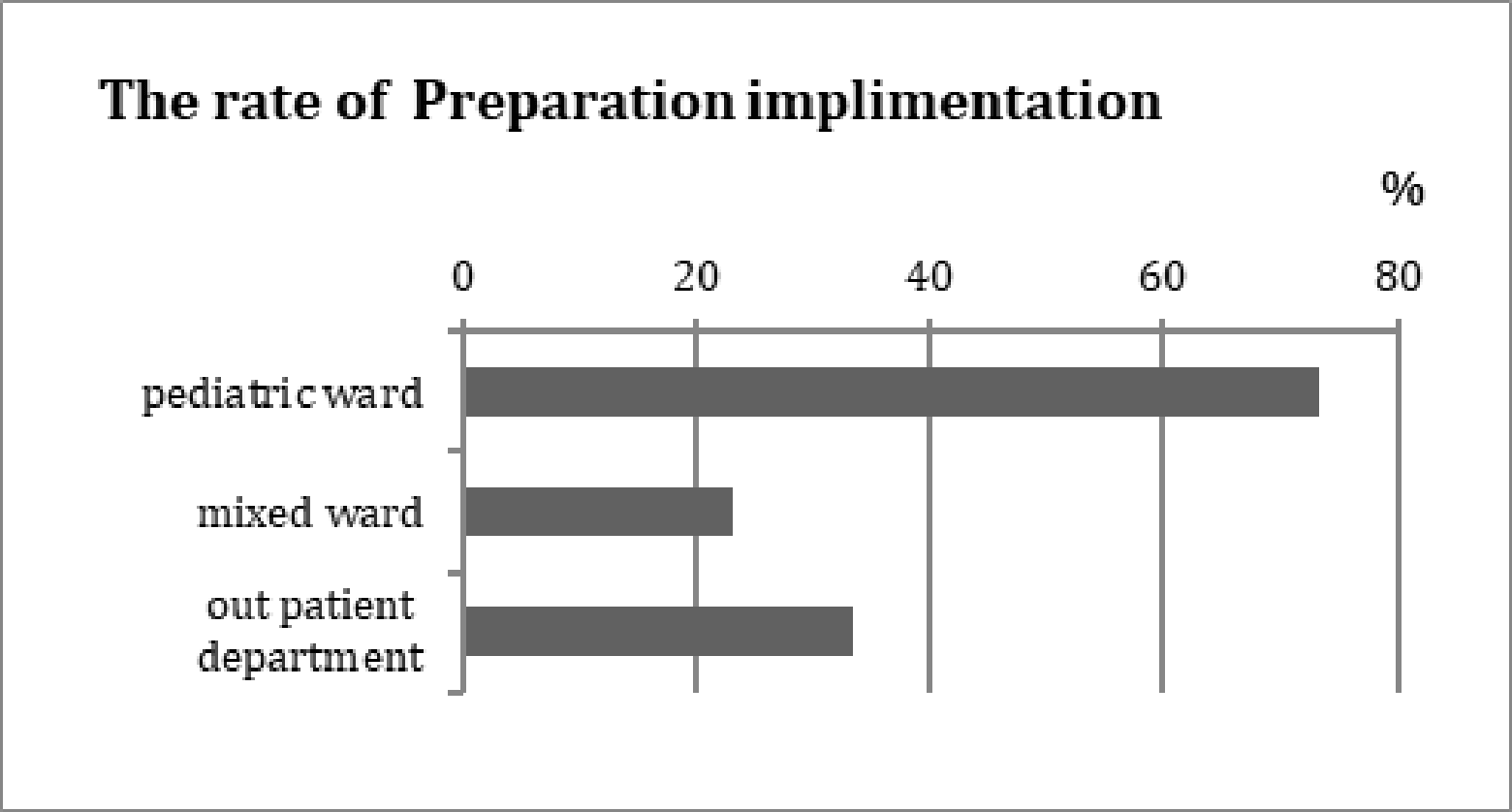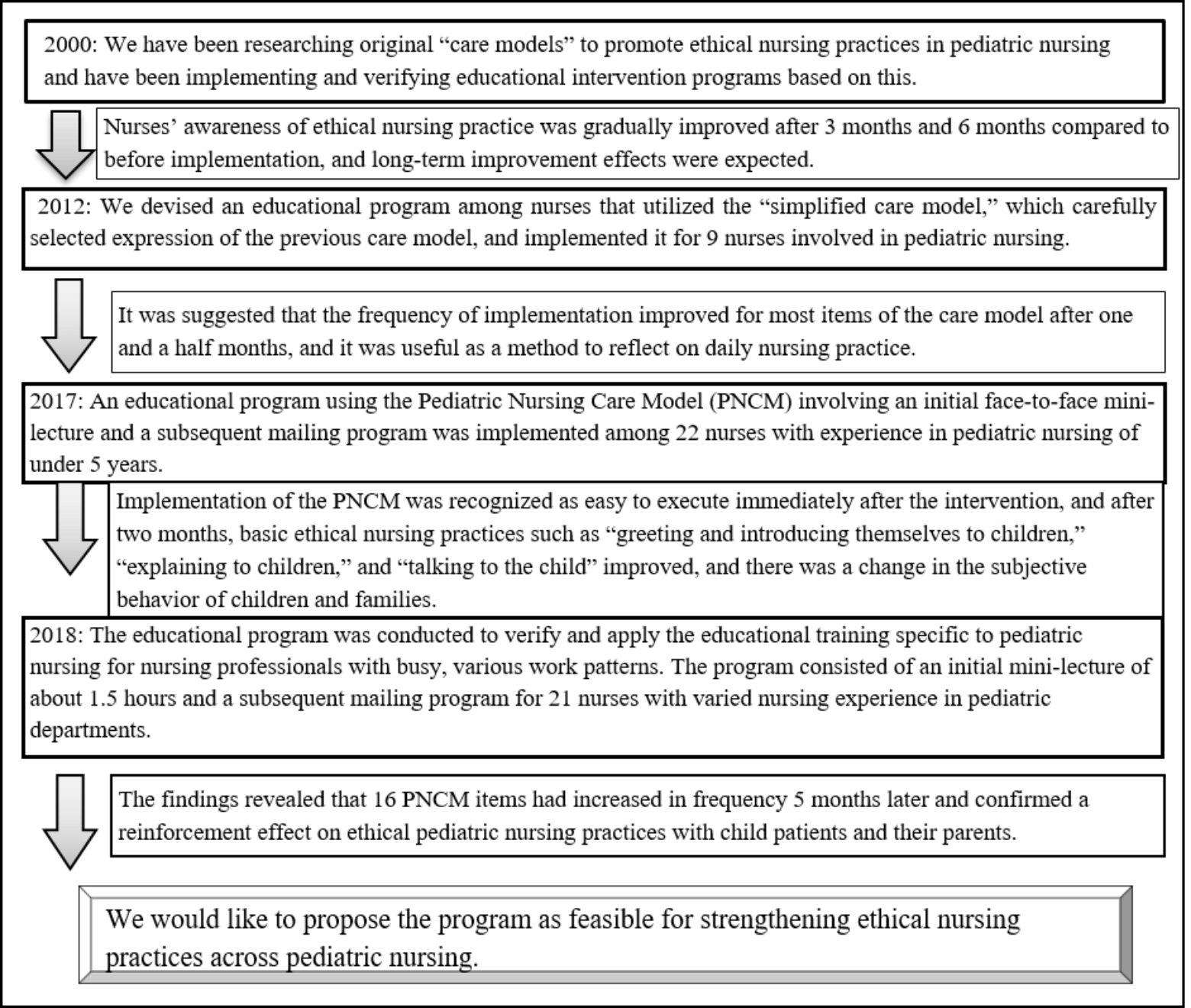Research Summary
Abstract
The Pediatric Nursing Care Model, which we have developed since 2000, summarizes basic ethical nursing practices for children and families into 24 simple expressions involving the elements of psychological preparation. As a result of verifying the effectiveness of an educational program that was originally devised in 2012 using this model, the effect on nurses with little experience in pediatric nursing and on nurses with experience of various other departments has been clarified. Therefore, we should implement this educational program for nurses practicing pediatric nursing in various locations, such as mixed wards and community clinics, and clarify the improvement effect of ethical nursing practices.
Background
Since the 1970s, psychological preparation (PP) (explanations to children, alleviation of their anxiety, etc.) has been used in the field of nursing to reduce psychological disturbance among children receiving medical care in Europe and the United States. Since the 1980s, World Health Organization recommendations for nursing children in hospitals (1982) and hospital children’s charters (1988) have been enacted, and medical care and nursing while protecting children’s rights have become more taken more seriously. In the latter half of the 1990s, nursing practices to protect the dignity of children and parents through PP began to be actively practiced, and in 1999, the Japan Nursing Association advocated the necessity of easy-to-understand explanations for children and guardians in the nursing duty standards of pediatric nursing. Japan’s basic nursing education system has only a general nursing course, however. In 2009, the revision of the national examination standards for Japanese nurses’ licenses added the contents of PP and informed assent for child patients. We have been studying the consideration of the human rights of children in the hospital environment and found that awareness of ethical nursing practices in pediatric wards is steadily improving (Matsumori, 2015). However, as a result of searching the literature using the keywords “pediatric nursing,” “preparation,” and “nursing ethics” in Japanese medical journals, the number of journal items on “preparation” exceeds the number of on “nursing ethics” (Fig. 1).

Fig. 1. Changes in the Japanese literature on pediatric nursing for preparation and nursing ethics
1. Ethical nursing practice issues in pediatric nursing
According to a survey conducted by the Ministry of Health, Labor, and Welfare (2019), there are 19,647 pediatric clinics in Japan (19% of all general clinics), a s well as 2,539 general hospitals (35% of all general hospital) that have pediatric departments. The number of mixed wards with combined pediatric and adult wards has increased rapidly since 1994, and according to a survey by Kobayashi et al. (2013), about 70% of hospitals providing pediatric care are mixed wards. The increase in the number of mixed wards was caused by a decrease in the birth rate in Japan.
In 2000, less than 50% of nurses explained to children that they intended to respect the child’s right to know, but by 2005, this had increased to 70% and by 2010 to 90% (Onishi, 2002; Matsumori, 2006, 2013). Takahashi et al. (2014) have pointed out that nurses who have careers of less than five years have been discussing situations concerning the violation of children’s rights among nurses, but this has not led to ethical nursing practices. Improving awareness and practice among nurses in mixed wards is also a challenge. Nurses who “know preparation” account for 75% of nurses in pediatric wards and 45% in mixed wards. Nurses who practice preparation account for 73.3% in pediatric wards, 23.2% in mixed wards, and 33.3% in pediatric outpatient departments, while in mixed wards, recognition and implementation are low (Yoneyama, 2008; Honma, 2009).


Fig. 2. Comparison of ward types for cognition and implementation rates of preparation
2. Development of educational programs to promote ethical nursing practices in pediatric nursing
Since 2000, we have been researching original “care models” to promote ethical nursing practices in pediatric nursing and have implemented and verified educational intervention programs based on this (Fig.3). The care model is a collection of typical examples of ethical practices for children and their family undergoing examination and treatment in pediatric nursing and involve the elements of PP. As a result of having clinical nurses implement this model, awareness of ethical nursing practices was gradually improved, and long-term improvement effects were expected (Matsumori, 2012, 2016, 2018, 2021).
It is important to ensure the quality of the expertise of pediatric nursing in various pediatric medical care facilities because of the trends for short-term hospitalization or mixed wards in Japan. There is an imbalance in expertise in pediatric nursing among medical facilities, such as the difference in ethical nursing practices among nurses on mixed wards who are unfamiliar with interaction with children and families, and quality issues in care for children and pediatric nursing training in each hospital. However, there is a shortage of systematized training programs specific to pediatric nursing for new nurses, for pediatric nursing beginners in mixed wards, and for those who have experience in other departments. In the future, education programs should be implemented not only for pediatric wards but also for nurses practicing pediatric nursing in various other facilities, such as mixed wards and community clinics, and the impact will then be clearer. In addition, this educational program consists of short mini-lectures and can be taken by mail or online. It also needs verification and application as educational training specific to pediatric nursing for nursing professionals with busy, various work patterns. We would like to propose it as a feasible education program to strengthen ethical nursing practices in pediatric nursing of all kinds.

Fig. 3. The process of development of the educational program using PNCM among nurses working in various pediatric institutions
Research Summary
- Honma, A., Kako, M., Okubo, A., Fukazawa, E.,& Kawakami, M. (2009). Survey of the pediatric nursing practices in A prefecture Part 2; Preparation for children, training for new and staff nurses. Journal of the Japan Society of Nursing: Pediatric nursing, 39: 74-76.
- Matsumori, N.,Ninomiya,K.,Ebina, M., Katada,N.,Katsuda,H., Kosako, Y.,& Fukuchi, M. (2006). Practical application and evaluation of a care model for informing and reassuring children undergoing medical examinations and/or procedures (Part 2): Methods of relating and practical nursing techniques that best bring out the potential of children. Japan Journal of Nursing Science, 3: 51-64. https://doi.org/10.1111/j.1742-7924.2006.00052.x
- Matsumori, N. (2012). The practices of pediatric nursing care model. [Japanese]. Tokyo, Japan: Herusu Shuppan, Co. Inc.
- Matsumori, N. and Isfort M. (2013) Psychological Preparation Practices for Children Undergoing Medical Procedures in Japan and Germany. Open Journal of Nursing, 3: 281-286. http://dx.doi.org/10.4236/ojn.2013.32038
- Matsumori N. (2015). Psychological Preparation of Children for Medical Procedures: An Awareness Survey Targeting Nurses in Japan. Open Journal of Nursing. 2015; 5: 613-621. http://dx.doi.org/10.4236/ojn.2015.57065
- Matsumori, N. (2016). Nurse’s impressions and changes after the workshops using the pediatric nursing care model. Journal of Nursing Education and Practice, 6: 82–89. https://doi.org/10.5430/jnep.v6n9p82
- Matsumori, N. (2018). Effects of an intervention program for promoting ethical practices among pediatric nurses. Comprehensive Child and Adolescent Nursing. 10.1080/24694193.2018.1470704 https://doi.org/10.1080/24694193.2018.1470704
- Matsumori, N.(2021). Studying the Reinforcement Effect of a Seminar on Ethical Practices among Pediatric Nurses. Open Journal of Nursing, 11: 152-163. https://doi.org/10.4236/ojn.2021.113014
- Development of educational programs to promote ethical nursing practices in pediatric nursing in Japan, African Journal of Medical Case Reports, 9 (2), pp.003, JULY, 2021. https://www.internationalscholarsjournals.com/articles/development-of-educational-programs-to-promote-ethical-nursing-practices-in-pediatric-nursing-in-japan.pdf
- Ministry of Health, Labour and Welfare (2019) Survey of Health Institutions in Japan [Japanese]. https://www.mhlw.go.jp/toukei/saikin/hw/iryosd/19/dl/02sisetu01.pdf
- Onishi, F, Sugiura, T, & Hane,Y (2002). The state of informed consent to children performed by nurses; From the results of survey for the pediatric hospitals with more than 400 beds in Japan. Journal of the Japan Society of Nursing, 11(1): 60-69.
- Takahashi, K., & Hamanaka, K. (2014). Interrelation between advocacy of children’s rights and experience of ethics education in nursing [Japanese]. The Japanese Journal of Health Science, 18: 21-31.
- Yoneyama, M., Nonaka, J., Osada, I., & Takahashi, I. (2008). Hospital environments of children in B Prefecture: results from a survey of nurse managers. Journal of Kanagawa University of Human Services, 5(1):83-93.